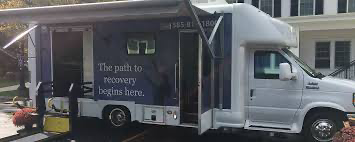
Governor Andrew M. Cuomo announced on Tuesday that nearly $853,000 in a second round of funding awards to five providers across New York State to enable them to purchase and operate mobile treatment vehicles. The goal of this initiative is to expand the availability and access to addiction treatment services in underserved regions of the state. Funding is being administered by the New York State Office of Addiction Services and Supports and was awarded through the federal State Opioid Response Grant. More than $972,000 was awarded in the first round of this funding, bringing the total amount awarded to more than $1,825,000.
"Despite the many challenges caused by the current COVID-19 pandemic, we must continue to remain vigilant in our fight against the ongoing opioid epidemic," Governor Cuomo said. "This critical investment for addiction treatment services will help to ensure that we are improving access to care and meeting the treatment needs of all New Yorkers no matter where they live, while enhancing our innovative and multi-pronged approach to the opioid epidemic."
"We are committed to investing in treatment services across the state to help individuals and families struggling with addiction," Lieutenant Governor Kathy Hochul said. "This funding to expand mobile treatment will help to ensure critical access to care and services needed in underserved regions of the state. We want to make sure people have access to the resources and services they need to lead healthy and safe lives, especially during the COVID-19 pandemic, and continue our efforts to combat the opioid epidemic in New York."
Over the past several years, New York State has greatly expanded its mobile treatment capability. This began in 2017, with the establishment of Centers of Opioid Treatment Innovation to serve high-need counties throughout the state. The COTIs are focused on establishing connections with people affected by addiction, who have not been connected to care previously or have been unable to sustain their recovery through traditional treatment approaches. COTI services, including mobile treatment, have helped engage more than 13,000 New Yorkers in treatment through non-traditional means, and has helped providers expand their outreach in previously underserved areas.
OASAS Commissioner Arlene González-Sánchez said, "Meeting people where they are is more important than ever and this new funding to provide mobile treatment services will be invaluable in helping to expand access to life-saving resources for New Yorkers who are dealing with addiction. The opioid crisis coupled with the pandemic presented us with a significant opportunity to look for more ways to expand our reach to underserved communities and to help individuals who are unable to travel distances due to lack of transportation or other personal or geographical reasons."
Providers in New York State utilize two types of mobile treatment vehicles:
- Modified vans with the ability to provide counseling services one-on-one or in a small group, and telepractice capability.
- Full "mobile clinics" with bathrooms, exam space, telepractice capability and the ability to provide the full array of outpatient services.
Central New York
- St. Lawrence County Community Services: $225,000
Long Island
- Outreach Development Corporation: $77,800
Mid-Hudson
- Bridge Back to Life Center: $225,000
Capital Region
- Promesa, Inc.: $100,000
New York City
- Promesa, Inc.: $225,000
Since taking office, Governor Cuomo has instituted an aggressive, multi-pronged approach to addressing the opioid epidemic, and created a nation-leading continuum of addiction care with full prevention, treatment, and recovery services. To combat this epidemic, the Governor has worked to expand access to traditional services, including crisis services, inpatient, outpatient, and residential treatment programs, as well as medication assisted treatment, and mobile treatment and transportation services.
In 2016, Governor Cuomo's Heroin Task Force recommended new, non-traditional services, including recovery centers, youth clubhouses, expanded peer services, and open access centers, which provide immediate assessments and referrals to care. These services have since been established in numerous communities around the state, and have helped people in need access care closer to where they live.
The Governor has advanced legislative and regulatory reform to enable people to get treatment faster and at the same level of coverage as for medical or surgical care by eliminating many insurance restrictions, as well as legislation to reduce most opioid prescriptions from 30 days to seven days, and legislation to increase training and education for prescribers. Governor Cuomo has also taken action to combat patient brokering and fraudulent addiction treatment services.
The Governor has also worked to increase training and availability of naloxone, resulting in more than 420,000 individuals in New York State trained and equipped with the opioid overdose reversal medication. Through Governor Cuomo's actions, pharmacies around New York State are now able to provide naloxone without a prescription.
New Yorkers struggling with an addiction, or whose loved ones are struggling, can find help and hope by calling the state's toll-free, 24-hour, 7-day-a-week HOPEline at 1-877-8-HOPENY (1-877-846-7369) or by texting HOPENY (Short Code 467369).
Available addiction treatment including crisis/detox, inpatient, community residence, or outpatient care can be found using the NYS OASAS Treatment Availability Dashboard at FindAddictionTreatment.ny.gov or through the NYS OASAS website.